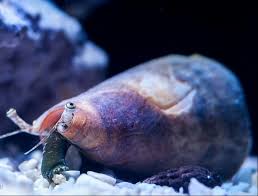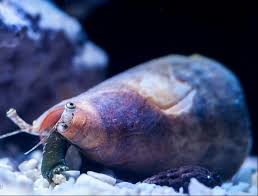Reefflex
Sand Tiger Conch
Sand Tiger Conch
Couldn't load pickup availability
The Sand Tiger Conch is a hardy and beneficial sand-sifting snail, known for its elongated, heavy shell and characteristic trunk-like siphon. Despite its name, it is peaceful and non-aggressive, making it an excellent addition to reef tanks. Native to Indo-Pacific and Caribbean sandy reef beds, this snail is highly effective at cleaning detritus, algae, and leftover food from the sandbed, helping maintain a healthy aquarium substrate.
Care Guide:
- Tank Size: Minimum 30 gallons, but larger tanks (50+ gallons) provide more stable food sources.
- Temperament: Peaceful, does not bother other tank inhabitants.
-
Diet: Detritivore/Herbivore – primarily consumes:
- Detritus, leftover food, and decaying matter
- Algae and diatoms growing on the sandbed
- Can be supplemented with algae wafers or sinking pellets if the natural food supply is low.
-
Water Parameters:
- Temperature: 74-80°F (23-27°C)
- pH: 8.1-8.4
- Salinity: 1.023-1.025
- Ammonia/Nitrite: 0 ppm
- Nitrate: <10 ppm preferred
- Calcium: 400-450 ppm (for healthy shell growth)
- Flow: Moderate to low – thrives in sandy substrates with gentle water flow.
- Reef Safe? Yes, completely reef-safe and will not harm corals or invertebrates.
-
Tank Setup:
- Requires a deep, fine sandy substrate for burrowing and sifting.
- Avoid sharp, coarse substrates, as they can damage the snail's soft foot.
-
Compatibility:
- Ideal for reef tanks and peaceful community setups.
- Safe with fish, corals, and most invertebrates.
- Avoid housing with aggressive predators such as triggers, puffers, and large wrasses, which may prey on it.
Special Considerations:
- Food Supply: If the sandbed is too clean, supplement their diet with algae-based foods to prevent starvation.
- Burrowing Behavior: They may partially bury themselves in the sand, which is normal and helps oxygenate the substrate.
Summary:
The Sand Tiger Conch is a valuable, reef-safe sand-sifting snail, perfect for keeping the sandbed clean and well-aerated. With a stable food source, fine sand, and peaceful tank mates, it will thrive and contribute to a healthy, balanced reef aquarium.


